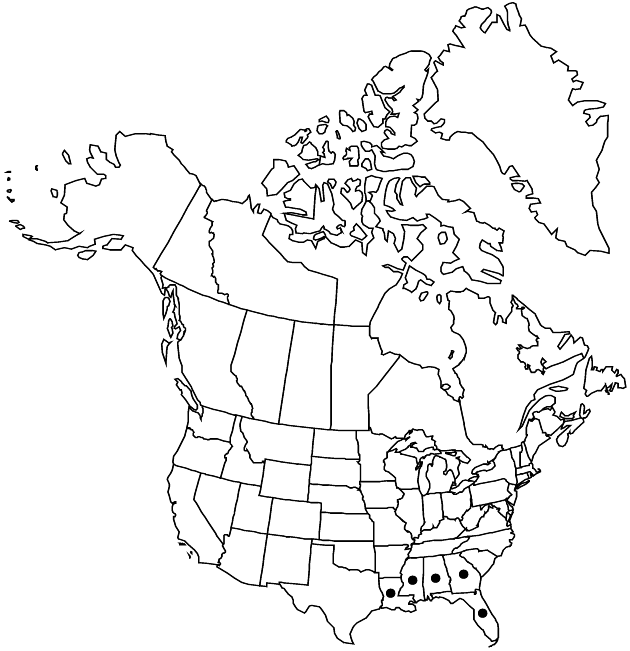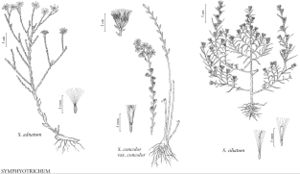Difference between revisions of "Symphyotrichum adnatum"
Phytologia 77: 275. 1995.
FNA>Volume Importer |
imported>Volume Importer |
||
| (One intermediate revision by the same user not shown) | |||
| Line 8: | Line 8: | ||
}} | }} | ||
|common_names=Scaleleaf aster | |common_names=Scaleleaf aster | ||
| + | |special_status={{Treatment/ID/Special_status | ||
| + | |code=F | ||
| + | |label=Illustrated | ||
| + | }}{{Treatment/ID/Special_status | ||
| + | |code=E | ||
| + | |label=Endemic | ||
| + | }} | ||
|basionyms={{Treatment/ID/Basionym | |basionyms={{Treatment/ID/Basionym | ||
|name=Aster adnatus | |name=Aster adnatus | ||
| Line 59: | Line 66: | ||
|publication title=Phytologia | |publication title=Phytologia | ||
|publication year=1995 | |publication year=1995 | ||
| − | |special status= | + | |special status=Illustrated;Endemic |
| − | |source xml=https:// | + | |source xml=https://bitbucket.org/aafc-mbb/fna-data-curation/src/2e0870ddd59836b60bcf96646a41e87ea5a5943a/coarse_grained_fna_xml/V19-20-21/V20_1102.xml |
|tribe=Asteraceae tribe Astereae | |tribe=Asteraceae tribe Astereae | ||
|genus=Symphyotrichum | |genus=Symphyotrichum | ||
Latest revision as of 19:58, 5 November 2020
Perennials, 30–120 cm, cespitose; with herbaceous or thick, woody, sometimes cormoid caudices. Stems 5+, erect to scandent-sprawling (brown, branched from middle), moderately to densely finely hairy. Leaves (yellowish green) thick, firm, margins entire; basal early deciduous, sessile or subpetiolate, blades (3-nerved) oblanceolate to obovate, 10–43 × 7–15 mm, bases cuneate, margins scabrous, apices acute to obtuse, faces sparsely finely scabrous; proximal cauline sessile, blades narrowly obovate to oblanceolate, 20–35 × 5–13 mm, bases auriculate-clasping, margins finely scabrous, apices acute to obtuse, faces finely scabrous, shiny; distal sessile, blades lanceolate to linear, 3–10 × 1–4 mm, gradually reduced to bracts distally, bases subclasping and adnate to stem for 1/2+ length, apices narrowly acute, white-spinulose, faces finely scabrous, viscid, minutely stipitate-glandular. Heads in ± open, paniculiform arrays, branches initially patent then ascending or divaricate. Peduncles densely short-strigose, glandular, bracts linear, adnate, densely short-strigose. Involucres campanulate, 4–6.5 mm. Phyllaries in 4–5 series, oblong to oblanceolate, strongly unequal, bases (tan) ± indurate, margins hyaline, finely scabrous, green zones lenticular, in distal 1/4–2/5, apices obtuse, mucronate to finely subspinulose, faces scabrellous-puberulent, stipitate-glandular. Ray florets 10–20; corollas light to dark lavender, laminae 5–8 × 0.5–1.5 mm. Disc florets 12–25; corollas yellow, 3.7–7 mm, throats narrowly funnelform, lobes triangular, 0.4–0.8 mm. Cypselae tan to brown, obovoid, not compressed, 2–2.5 mm, 6–10-nerved (faint), faces sparsely strigose; pappi tan, 3.75–8 mm. 2n = 20.
Phenology: Flowering Oct–Dec.
Habitat: Sandy, clayey soils, sandhills, oak-pine scrub, open pine flatwoods, roadsides
Elevation: 0–100+ m
Distribution

Ala., Fla., Ga., La., Miss.
Discussion
Selected References
None.
